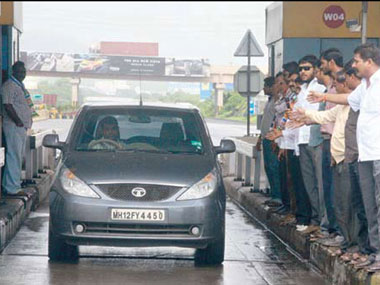A few days ago, the Maharashtra government under Chief Minister Devendra Fadnavis announced the closure of 12 toll plazas in the state and exempted cars and state transport buses from payments at 53 more nakas. But he avoided abolishing levies at five entry points to Mumbai and on the Mumbai-Pune Expressway – which are, by far, the biggest revenue generators for private toll contractors. This decision is largely wrong, even though it has short-term beneficial effects in three areas: time and fuel savings for cars and buses; less pollution, with fewer vehicles idling at toll nakas; and less corruption in cash-based toll collections. Despite the pluses, the decision is a bad one because it actually ends up mollycoddling motorists at the cost of society at large. And the one levy that should have been abolished – the entry and exit tolls in Mumbai – may remain, unless a committee headed by the additional chief secretary (public works) recommends its abolition by 31 July, when it is due to submit its report. The only toll that should not go is the one financing the Mumbai-Pune Expressway. The Mumbai entry-exit levies have to be abolished because they are not really tolls – which ought to be charged only when a new infrastructure facility is provided (like a new bridge or expressway). It would otherwise not have been built. Motorists pay merely to get in (or out of) Mumbai – with no improvements in road conditions or time spent on the road. The Mumbai toll plazas are the biggest single cause of vehicular pollution in and around the areas they are situated, as the sheer number of vehicles passing through vastly exceeds the physical collection abilities of the plaza operators. Why are the Maharashtra government’s decisions wrong? Here’s why. First, the purpose of tolling is to finance new infrastructure by charging only those users who will benefit directly from it. Abolishing them means the state exchequer will now have to find the resources internally for much-needed new roads and bridges. India’s prime industrial state has infrastructure that sucks. Second, the case for abolishing tolls was primarily that the contracts were awarded through a non-transparent process, with bidders guaranteeing a minimum annual revenue to government and then keeping the bulk of the proceeds. But all that was needed to be done was to make the process transparent. It did not need the wholesale abolition of tolls. Third, one reason given for abolishing tolls (which was part of the BJP-Sena election promise) was the severe congestion it was causing, as operators were unable to keep up with traffic growth. But the real problem with toll plazas was not the cost to motorists, but the method of its collection through manual cash payments. The solution to this problem is not abolition, but a shift to RFID (radio frequency ID)-based technology, which requires no car to stop at a toll naka. Pre-paid smart cards can automatically be debited every time a car passes through a toll plaza that’s equipped with RFID sensors. This is what Singapore does. A post-paid system can, also be created for the entire state (actually, we should have a single system for the whole country) once the infrastructure for it is created. [caption id=“attachment_1598319” align=“alignleft” width=“380”]  Representational Image. ibn live[/caption] Fourth, the abolition of tolls – if taken to the logical extreme and followed by other states – will needlessly favour car-owners. The only policy which makes sense for a country like India is to tax private vehicles and partially subsidise public transport – especially for the poor. By nearly abolishing tolls, Maharashtra is, in fact, doing the opposite. It is favouring private vehicle owners, and losing resources that could have gone to build a robust public transport network. The policy of not charging two- and three-wheelers was already flawed. The addition of cars to the free-riders list is adding insult to injury. It means the relatively better off will benefit at the cost of the poor. Fifth, while the abolition of toll plazas will reduce short-term automobile pollution, in the long run, the shift in emphasis to personal transport vehicles will end up increasing pollution as more people choose to travel by cars and two-wheelers. Sixth, toll plazas became a hot political issue not for their costs, but because the booty was not being shared with some political players. The end of tolling in many places reduces booth-level corruption, but as more money for infrastructure is routed through the government’s coffers, corruption in these projects will merely get centralised. Or infrastructure may never get built. Seventh, the logic of exempting private cars and charging trucks and private buses is confounding. Trucks being commodities to cities, and buses ferry passengers. Both are actually more important to public life than cars or two-wheelers. High tolls on trucks, which carry veggies and consumer goods, for example, impact retail prices. They affect everybody. Eighth, if no tolls can be collected, the state can forget about getting private investors in road infrastructure. Ninth, many of the private operators may move court against the abolition of tolls. The state may be asking for endless litigation. The real issue in tolls is not their cost in rupees, but in time, pollution and corruption. Tolls are always a good idea if they are transparent, easy to collect and avoid holding up vehicles too long. By abolishing tolls, Fadnavis has effectively made the building of new infrastructure more iffy, and subject to budgetary constraints.
Maharashtra is abolishing many road toll plazas, but this decision will prove costly in the long run. It puts a question-mark over future private investment in infrastructure
Advertisement
End of Article
Written by R Jagannathan
R Jagannathan is the Editor-in-Chief of Firstpost. see more


)

)
)
)
)
)
)
)
)



